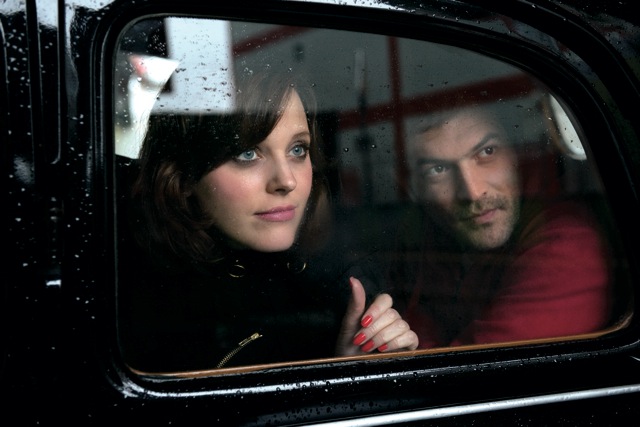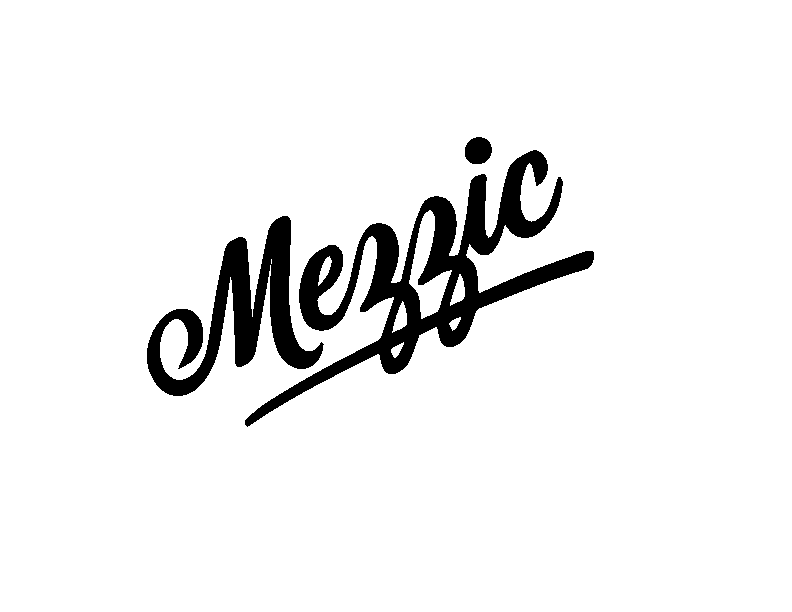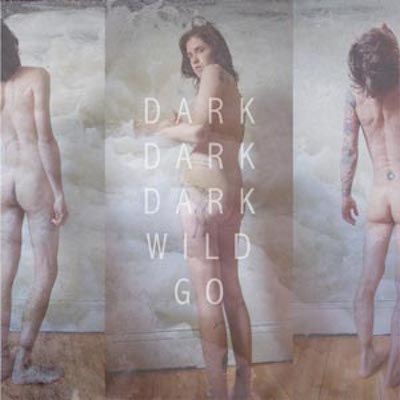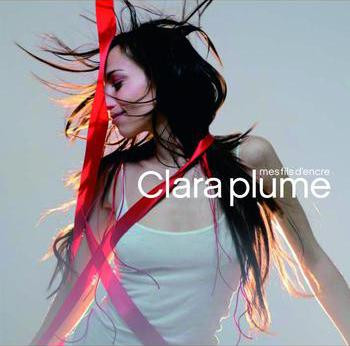
INTERVIEW: FELIPECHA
Back in 2007, I discovered hip-hop producer Wax Tailor‘s “Que Sera” in a Ninkasi (think Rock Bottom or The Great Dane). Soon thereafter, Tales of the Forgotten Melodies had me spinning, especially “Our Dance” featuring Charlotte Savary. Word got out she also performed in another group along with Philippe Chevallier, sung in French and some in Spanish. I count myself lucky for having the chance to see Felipecha in 2009 (review), a wonderful blend of chanson with a energetic kick of jazz. Philippe and Charlotte took the time to answer some questions about how they met, Paris, and their follow up to 2008’s De fil en aiguille. Un très grand merci à eux pour l’interview! [English translations are in brackets.]
You two met at Nanterre University. What were both of you studying and how did you stumble upon each another?
Philippe : History and geography, via Bruno, the bassist of my ex-band
Charlotte : Yes, we were both students there, but not in the same years, we met through a friend of Philippe’s. This friend was in my class and invited me to a couple events where I met Philippe. I was studying communication.
Charlotte, your songs sung in English with Wax Tailor were what attracted me to Felipecha. Yet it’s Felipe’s guitar and melodies, influenced by French folk, which left me stunned. What was the moment when you two decided to perform together?
Philippe : From university in 2001 to our first album , we were playing for fun. It became serious in 2006, when we met Manuel (guitarist and producer), opened a myspace page, and met Laetita, our first manager.
Cha : I met Manu in 2002 in a studio that produced music for commercials, then he asked me to do some vocals on some of his songs, and we lost touch, and met again by chance at a Wax Tailor and Brazilian Girls concert in Paris in 2005. I talked to him about Felipecha, and he said he was interested in recording some demos with us… that’s what really started it all. It all happened very naturally after that, we did some demos, met Laetitia, our first editor, our record company… in two years we released our first album.
Philippe, you’ve directed documentaries. How has film influenced your music? Who are some favorite directors?
Philippe: Sound and pictures are linked in the movies…I came to video with a musician point of view… I started to film live music, to edit film with the music rhythm in documentaries and video clips.
The approach is the same for me. Il s’agit de faire passer des émotions, visuelles ou musicales, la vue ou l’ouïe. Mais c’est la charge émotionnelle qui doit ressortir. La forme est différente, mais le fond est le même.
[It’s about making people feel emotions, visually or through music, through sight or sound. But it’s the emotional charge that you have to evoke. The form is different, but the core is the same.]
I have so many favorite directors… I can’t choose. The French “nouvelle vague” directors Truffaut, Godard. Italian as Fellini, Pasollini, Asian directors Joon-ho Bong and Wong Kar Wai…American ones….Miranda July, Peter Watkins, David Lynch.
Paris is known for its flourishing artistic community. From your perspective, what’s the Parisian music community like? (For instance, is it like a collection of separate artistic arrondissements or is it very integrated?)
Philippe: Il y a toute une sociologie des artistes parisiens, à l’image du pays d’ailleurs. On ne peut pas aujourd’hui parler d’une communauté soudée, unie, mais plutôt de courant séparés, avec des moyens différents, les uns dans le sérail, d’autres qui galèrent, et tout un panel au milieu.
Paris change très vite, est une ville très chère, mais aussi la ville où il y a le plus de studios, de salle de concerts, on trouve de tout, à tous les prix. Mais c’est plutôt individualiste, malheureusement.
[ There is a wide variety in the sociology of Parisian artists, as in the whole country. You can’t say it’s a close-knit, united community, but rather separate movements, with different methods, some in the seraglio, others who have a hard time, and many others in the middle.
Paris changes very quickly and is a very expensive city, but also a town where there’s the most studios and concert venues. You can find everything here, at any price. But it’s rather individualist, unfortunately. ]
Cha : There are many musical chapels in Paris, musicians regroup around projects, and often work with the same people, friendships and connections being the origin of professional opportunities. As in any other countries i guess. So the scene can feel a little closed in because of these tight groups, and the same people working with the same people most of the time.
Felipecha’s second album is called “Lignes de fuite”. How did the title come to be?
Philippe: Des points de vue différents qui convergent. A l’image de nos regards
[ Different perspectives that converge, like our looks. ]
Cha : “Perspective lines”. We’re two very distinct beings but fatefully our visions will meet in the end, just like perspective lines.
If the new album were a journey, what would the trip be like?
Philippe: Un voyage, en voiture, de Paris vers un ailleurs idéal. Une fuite à deux vers le jardin d’Éden.
[ A trip, by car, from Paris to an ideal place elsewhere. A two-person escape to the Garden of Eden. ]
Cha : I like that, passengers on a trip to somewhere, on a trajectory. The great experience being the journey, not the destination.
What song are each of you excited to perform on stage off “Lignes de fuite”?
Philippe: “La Tour Eiffel est un Tipi” pour la garantie sueur…
[ “La Tour Eiffel (Eiffel Tower) est un Tipi”, for its guaranteed sweat. ]
Cha : “Rien”, for it’s wordless single syllable chorus.
I noticed Christelle Lassort has been in the studio. How did you come to meet and bring her into the group?
Philippe: By Cha and the Wax crew.
Cha: Actually, Manuel introduced Christelle to us. She was the one playing on the first album. She really understands pop and indie music but has a great musical level (she can play first violin in classical). It’s pretty rare. Then I talked to JC (Wax Tailor) about her when we were thinking about adding another string player onstage. She’s been playing with Wax tailor also ever since.
When it comes to collaborating with other musicians (either as Felipecha, with Wax Tailor, or individually), what would you say is essential in fostering a creative, inspiring partnership?
Philippe: Il y a une dynamique dans l’échange, une remise en question des certitudes, et c’est aussi plus sympa que seul. Et quand on écoute chanter Cha, on a forcement envie de travailler avec.
[ The exchange is dynamic, a give-and-take questioning, and it’s also nicer than by yourself. And when you listen to Charlotte singing, you can’t help but want to work with her. ]
Cha : Respect and truthfulness are very important, with them you can say anything with diplomacy and help push each other’s limits. And oddly, I think independence is very important. I find having other musical interests is necessary personal balance. Other projects help expressing all the things that I don’t express in Felipecha. Felipecha is a facet of what Philippe and I do. We both need all the other stuff to refuel. And that helps us be very relaxed about what we do together, because it’s not ALL we do.
When struck with writer’s block/l’angoisse de la page blanche, what would you do to cure it?
Philippe: The work is the key… but it’s our secret. Don’t tell anybody.
Cha : On the contrary, I’m not hard working. I either have the inspiration or I don’t… I have my moments, and sometimes it’s no use. Journeys or going into hiding help a lot.
For someone who hasn’t heard your music before, how would you describe it?
Philippe: Je sais pas . Je lui ferais écouter. Les perceptions et représentations changent selon la personne. Chacun trouve, ou pas, quelque chose qui lui parle, lui ressemble, à des endroits très différents.
[ I’m not sure. I would make them listen. Perceptions and representations change according to the person. Each person finds, or not, something that speaks to them, reflects themselves, at very different places. ]
Cha : I would say we do pretty songs (de jolies chansons), they used to be very intimate and acoustic, but now they are more electric and pop, but they still are pretty songs.
Founder, Editor, Writer, Photographer. (Austin, Texas)




Post a comment